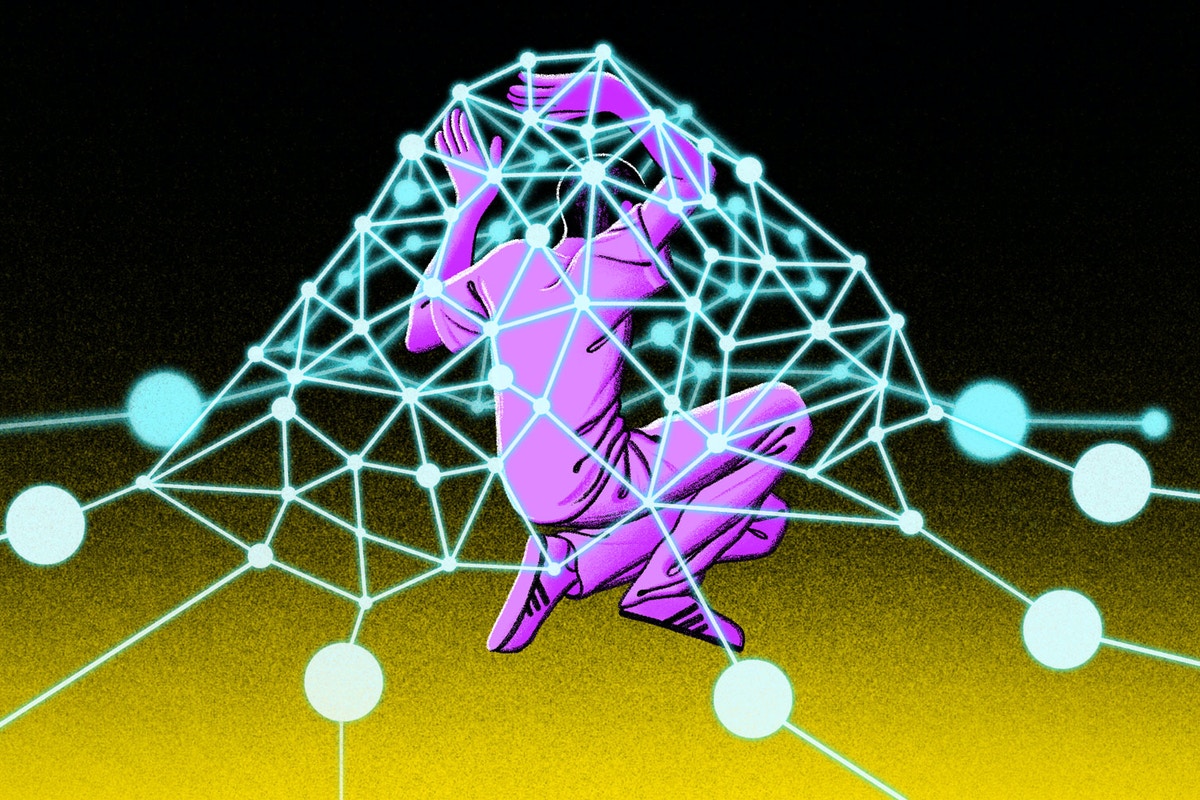Systems intended for ad targeting and UX optimization have become useful to law enforcement. This Context Check examines how that works and why.
Links
Unexpected Systems Acquire User Data
A Mozilla report found that mental health and prayer apps have particularly bad data privacy protections. The apps suck up personal information and have vague privacy policies.
As period tracker apps grow in popularity, so do concerns about what happens to the very personal information they share. Consumer Reports explains how to stay safe.
Pregnancy-tracking apps such as Ovia have climbed in popularity as fun, friendly companions for the daunting uncertainties of childbirth. But they have also become powerful monitoring tools for employers and health insurers.
A growing and unregulated trend of online surveillance raises concerns for civil rights and liberties.
The Markup identified 107 apps that sold data to X‑Mode in 2018 and 2019
While I think we can all agree that every app on our phone is probably an invasive little shit, I’d argue that weather apps deserve their own little corner in hell. We’ve seen weather apps sign folks up for services without their say-so, sneakily get location data from users who deliberately turned that function off,…
Seemingly simple mobile games made us all way too comfortable with giving away our personal information.
https://www.nytimes.com/2017/12/28/business/media/alphonso-app-tracking.html
If your algorithms are smart enough to realize that I was pregnant, or that I’ve given birth, then surely they can be smart enough to realize that my baby died, and advertise to me accordingly — or maybe, just maybe, not at all.
A surprising number of the top 100,000 websites effectively include keyloggers that covertly snag everything you type into a form.
https://www.nytimes.com/2012/02/19/magazine/shopping-habits.html

Tools used to find child abuse material could be wielded in the US to protect “unborn children” if the EU bans end-to-end encryption.
The social media giant gathers data from crisis pregnancy centers through a tracking tool that works whether or not a person is logged in to their Facebook account
Personal information from reviewers was also exposed until The Markup’s inquiry
Founder of fastlane.tools
The Federal Trade Commission filed a lawsuit against data broker Kochava Inc.
Even a burner phone paid for with cash can reveal your identity and where you’ve been. A data privacy expert explains.
How ad tech companies (and the marketers and publishers that enable them) use our most sensitive, personal information against cancer victims and their families.
Niantic says it is using data generated by Pokémon Go players to create a “Large Geospatial Model” that can navigate the real world and power robots.
As age verification bills pass across the world under the guise of “keeping children safe online,” governments are increasingly giving themselves the authority to decide what topics are deemed “safe” for young people to access, and forcing online services to remove and block anything that may be...
Data Brokers
It costs just over $160 to get a week's worth of data on where people who visited Planned Parenthood came from, and where they went afterwards.
Data brokers have tried to improve their public image and address privacy concerns by sharing location records with public health agencies.

These firms could track whether you've visited your therapist's office or your ex's house. And without regulation, they're a threat to democracy.
Policymakers have paid scant consideration to the national security implications of unfettered, largely unregulated data brokering. That may be changing.
Police are using data brokers and app location data to surveil people in violation of the Fourth Amendment.
Danielle McNamara
The family safety company was approached by regulators about its data sales
The case suggests this loosely regulated industry can’t deliver on its promises of privacy
Researchers said it was "trivial" to identify users and view their browsing habits in purchased 'anonymous' browsing data.
Unique IDs linked to phones are supposed to be anonymous. But there’s an entire industry that links them to real people and their address.
When most of us think of how the concept of “data” has been skewered by the press, we’re probably thinking about an app’s location data tipping off our home address, or apps like Grindr tipping advertisers off about our sexuality. What’s less scrutinized, both by the public and by those in public office, is data that’s…
Gizmodo identified 32 brokers selling data on 2.9 billion profiles of U.S. residents pegged as "actively pregnant" or "shopping for maternity products."
Not long ago, the ability to remotely track someone’s daily movements just by knowing their home address, employer, or place of worship was considered a powerful surveillance tool that should only be in the purview of nation states. But a…
Privacy advocates gained access to a powerful tool bought by U.S. law enforcement agencies that can track smartphone locations around the world. Abortion clinics, places of worship, and individual people can all be monitored without a warrant.
More than 3 billion phone coordinates collected by a US data broker expose the detailed movements of US military and intelligence workers in Germany—and the Pentagon is powerless to stop it.
The company confirmed the breach after a hacker posted millions of location data records online.
How Law Enforcement Acquires Your Data
This report was also authored by Carey Shenkman, an independent consultant and Human Rights Attorney. Introduction Typically, government agencies seeking access to the personal electronic data of Americans must comply with a legal process to obtain that data. That process can be mandated by the Constitution (the Fourth Amendment’s warrant and probable cause requirement) or […]
Upturn advances equity and justice in the design, governance, and use of technology.
'It’s just a question of, one, is it ethical, and two, does that open up the information to being released elsewhere?,' a former Venntel worker told Motherboard.
A hack using a forged legal request that exposed consumer data collected by Apple and Meta shed light on the reach of the law
A new bill known as the Fourth Amendment is Not for Sale Act would seal up a loophole that intelligence and law enforcement agencies use to obtain troves of sensitive and identifying information to which they wouldn’t otherwise have legal access. The new legislation, proposed by Senators Ron …
A Muslim prayer app with over 98 million downloads is one of the apps connected to a wide-ranging supply chain that sends ordinary people's personal data to brokers, contractors, and the military.

ICE emails provide a rare inside look at the agency’s use of Facebook and commercial data brokers to track down an immigrant in California.
The House Committee on Oversight and Reform has opened an investigation into how data broker Venntel collects and sells data from Americans’ mobile phones to government agencies.
Newly released documents showed the CDC planned to use phone location data to monitor schools and churches, and wanted to use the data for many non-COVID-19 purposes, too.
Right now, there’s a good chance your digital life is multitudes bigger than it was just a few months ago. Over time, the global coronavirus pandemic has turned a lot of us—or at least everyone I know—into the type of person who dates digitally, mourns digitally, and attends everything from church to support groups…
“Autonomous vehicles are recording their surroundings continuously and have the potential to help with investigative leads,” an internal training document states.
One of two American adults is in a law enforcement face recognition database. An investigation.
A period tracker app probably won’t tell authorities if you’ve had an abortion, but other data will.
The data privacy risks associated with abortion aren’t hypothetical. Cases around the world show how a digital trail can become evidence.
Ten states where ending a pregnancy is now illegal have sent the search giant more than 5,700 demands for location tracking data since 2018 — showing the data's potential usefulness to authorities enforcing abortion bans.
A Nebraska teenager is facing criminal charges alleging she aborted a fetus in violation of state law, after authorities obtained her Facebook messages using a search warrant.
Brokers say a potential privacy bill could hamper their work with law enforcement and overly restrict their industry.
A data broker has been selling raw location data about individual people to federal, state, and local law enforcement agencies, EFF has learned. This personal data isn’t gathered from cell phone towers or tech giants like Google — it’s obtained by the broker via thousands of different apps on Android and iOS app stores as part of the larger location data marketplace.

Local law enforcement agencies from suburban Southern California to rural North Carolina have been using an obscure cellphone tracking tool, at times without search warrants, that gives them the power to follow people’s movements months back in time, according to public records and internal emails obtained by The Associated Press.
U.S. government officials are adding data from as many as 10,000 electronic devices each year to a massive database they’ve compiled from travelers' devices.
A new report by a conservative think-tank raises privacy concerns as the organization tracks thousands of mobile devices belonging to newly arrived migrants at NGO and U.S. government facilities.

Rather than obtaining a warrant, the bureau purchased sensitive data—a controversial practice that privacy advocates say is deeply problematic.
Your tax dollars are going to data brokers.
The “Augury” platform includes highly sensitive network data that Team Cymru, a private company, is selling to the military. “It’s everything. There’s nothing else to capture except the smell of electricity,” one cybersecurity expert said.
Findings of a congressional inquiry raise privacy concerns as some states seek to criminalize abortion.
The Secret Service has used a technology called Locate X which uses location data harvested from ordinary apps installed on phones. Because users agreed to an opaque terms of service page, the Secret Service believes it doesn't need a warrant.
For months members of the public have been using GeoSpy, a tool trained on millions of images that can find the location a photo was taken based on soil, architecture, and more. It's GeoGuesser at scale.
The Trump administration is pooling data on Americans. Experts fear what comes next.
Anti-choice Activists and Bounties
Body cams and license plates are already being used to track people arriving at abortion clinics.
https://www.nytimes.com/2021/09/10/us/politics/texas-abortion-law-facts.html
Inside the Extreme Effort to Punish Women for Abortion
The Missouri GOP is proposing SB 72, which includes a "certified bounty hunter program" to pay private citizens to track down undocumented immigrants.It also mandates involuntary DNA collection and the creation of anonymous tiplines with paid rewards per arrest.https://www.senate.mo.gov/25info/pdf-bill/intro/SB72.pdf
Abortion and User Data

Self-managed abortion (SMA) with pills is very medically safe and effective throughout early pregnancy, but there is a significant risk of criminalization in many U.S. states. While it is impossible to fully eliminate the risk of criminalization when having or planning to have an abortion at home, t
When it comes to reproductive rights, your digital trail matters more than you think.
Internet searches, visits to clinics and period-tracking apps leave a digital trail.
Donald Trump’s possible election and the negative consequences are discussed by superstar Janelle Monáe, Grammy-nominated artist, actor and author.
For little more than $160, SafeGraph peddled the private data of people who go to abortion clinics, VICE reports.
me: i’m not seeing how cops could use fertility app data to persecute abortions!
— shoshana wodinsky (she/her) (@swodinsky) May 4, 2022
someone in adtech: [offers a completely plausible/horrifying explanation]
me: o ok thank u :( https://t.co/8ZkOUZzdyP
i love digital marketing!!!!!! https://t.co/ApYmsNSvOy
— shoshana wodinsky (she/her) (@swodinsky) May 4, 2022
thanks :( https://t.co/NB38pMvwN1
— shoshana wodinsky (she/her) (@swodinsky) May 4, 2022
Sen. Ron Wyden said shady data practices put the 'lives and essential rights of women' at risk.
Placer.ai allowed anyone to freely create an account and start using its visualized data to see where visitors to Planned Parenthood facilities approximately live.
The digital platforms people rely on to access or learn about abortion are also being wielded to spy on and punish them.
Experts say smartphone data could be used to monitor people seeking abortions.
Consumer Reports evaluated period tracker apps to find out how well they protect your privacy. The data the apps collect could be used against you in a post-Roe v. Wade world.

Jia Tolentino writes about the overturning of Roe v. Wade after the Supreme Court’s decision in Dobbs v. Jackson’s Women’s Health Organization, the future for abortion rights, and the importance of reproductive justice.
“We’re going to keep doing this work no matter how bad it gets because it’s a matter of life and death”
Anti-Abortion Centers Find Pregnant Teens Online, Then Save Their Data
Now that abortion is illegal for millions, firms such as Amazon, Facebook and Google are reckoning with the prospect of data requests on users for prosecutions.
Court records reveal how police in the U.S. use text messages, emails, search history to prosecute people seeking abortions.
Social-media sites are inundated with police requests for user data and may cooperate even if not legally required to, one legal expert told Insider.
A Wisconsin group used precise geolocation data until last year to direct ads to women it suspected of seeking abortions.
Her mother, who faces up to five years in jail, was charged after her private Facebook messages with her daughter were obtained by the police.
Fighting Back

Donald Trump has vowed to deport millions and jail his enemies. To carry out that agenda, his administration will exploit America’s digital surveillance machine. Here are some steps you can take to evade it.
For the thousands of people protesting and reporting on George Floyd’s death at the hands of the Minneapolis Police Department—or even for bystanders caught up in the demonstrations—arrests, injuries, and even death are becoming commonplace in this moment. And just like protests we’ve experienced within the past decade
Tips, tools and techniques to keep you and your community safe while fighting for the right to reproductive healthcare. If you or someone you know is concerned about unwanted data collection while navigating online resources, providing or seeking services, or organizing with others, here is a list of guides to stay safe while doing so.

Keep Your Abortion Private & SecureWe’re happy you’re here to learn more about digital security & abortion!
i can't tell you how easy it is to mash together voter registration data, location data, and like, your credit card history in order to figure out who's buying misoprostol, who's walking into a clinic, and who's voting pro-choice. and how *profitable* it is, too https://t.co/WuVuDmWrx0
— shoshana wodinsky (she/her) (@swodinsky) May 3, 2022
i wrote this piece 2 years ago when folks were dm'ing me, terrified abt attending protests and leaking sensitive data to cops in the process. this is a loooooong piece (and pretty grim), but most of the same steps apply here. and it's just as grim https://t.co/4BPi5QF7Xw
— shoshana wodinsky (she/her) (@swodinsky) May 3, 2022
i remember sitting alone in my apt like, 3k words in before realizing that i'd *never* be able to write anything airtight enough to promise people's complete safety. data marketplaces are just too opaque, too big, and too complicated. so i wrote this instead: pic.twitter.com/L8O8HQIERy
— shoshana wodinsky (she/her) (@swodinsky) May 3, 2022
tbh i should probably write an updated guide for our new awful reality, but the short version is:
— shoshana wodinsky (she/her) (@swodinsky) May 3, 2022
- never bring your phone with you to an abortion clinic. use a burner, if anything (and make sure that burner's off when you're at home)
— shoshana wodinsky (she/her) (@swodinsky) May 3, 2022
- never browse any sort of abortion-related content at home, if possible, and never on your own device. go to your local library for that
- never use your actual email / phone number to sign up for telehealth/clinic consultations. use a new protonmail for each, along with a new voip number. again, try not to do this at home
— shoshana wodinsky (she/her) (@swodinsky) May 3, 2022
- i'm seeing a lot of posts telling folks to delete fertility apps, which frankly, you should (they're notoriously scuzzy). but in my research, i've always found them sharing data about your cycle/pregnancy/birth control, *not* your abortion status https://t.co/JKUswuiBBv
— shoshana wodinsky (she/her) (@swodinsky) May 3, 2022
what you *do* need to worry about, in my experience, is what i mentioned up top: your donations to planned parenthood, your device being pinged inside an abortion clinic, your IP being caught surfing plan c sites
— shoshana wodinsky (she/her) (@swodinsky) May 3, 2022
that's why you use burners, and why—if you wanna donate to any of these orgs (which you should!!!!)—i'd recommend using cash to buy a prepaid card at your local CVS. bitcoin (ugh) is acceptable too, but the ledger's always made me itchy. cash is always the safest bet
— shoshana wodinsky (she/her) (@swodinsky) May 3, 2022
there's other steps too, but tldr;
— shoshana wodinsky (she/her) (@swodinsky) May 3, 2022
- don't do any abortion-related surfing / downloading anywhere near your house or regular devices
- pay in cash whenever you can
- keep your cellphone turned off as often as possible
- if you're protesting, cover your face, cover your body
feel free to dm me w any q's. i've been covering data brokers for years, and have read countless docs on pro-life advertisers and abortion clinic surveillance. never thought it'd come in handy like this!!!!!!
— shoshana wodinsky (she/her) (@swodinsky) May 3, 2022
last thing -- if you're gonna do this, use a PO box, and register it under a friend's name (if you can). the last thing you want is your name tied to this purchase https://t.co/5qm22KGrO9
— shoshana wodinsky (she/her) (@swodinsky) May 3, 2022
oh man, i completely forgot, *don't click on or scroll by any abortion/pro-choice/roe related ads, or any ads on sites covering these issues.* use tor if you need to. just trust me, ads bleed data about your device like you wouldn't believe https://t.co/3WjasdhBhA
— shoshana wodinsky (she/her) (@swodinsky) May 3, 2022
you can use an ad blocker, but tbh the most popular ones are often pawning data, too. if you really, really can't use a burner device, use tor. change your ip address often https://t.co/GekFyRczfS
— shoshana wodinsky (she/her) (@swodinsky) May 3, 2022
"social intelligence" is something you should also be aware of. both feds and for-profit brokers use it, and in both cases they're usually looking for keywords related to a given issue (like abortion). if you're gonna tweet about that, use an anon account https://t.co/TY7KbqbzoR
— shoshana wodinsky (she/her) (@swodinsky) May 3, 2022
calls—to clinics or otherwise—can also be tracked, by "conversation analytics" orgs, which then pawn off metadata from those calls to other brokers
— shoshana wodinsky (she/her) (@swodinsky) May 3, 2022
the way you know they're tapped in (usually) is that you'll hear something like "this call is being recorded for quality bla bla"
if you hear that, hang up, walk a few blocks outside, and use your burner to call back. that's admittedly a bit paranoid (this entire thread kinda is), but like..... data privacy in this country is a joke. overkill is the only way through
— shoshana wodinsky (she/her) (@swodinsky) May 3, 2022
gonna amend this thread a bit: if cops get creative enough (like in this example), they could pretty easily use data from fertility apps for persecutions. so yeah, delete those suckers now! https://t.co/dszIiMoctX
— shoshana wodinsky (she/her) (@swodinsky) May 4, 2022
At some point, everyone reaches a limit where they can no longer sit back and stay silent about injustice in the world. However, if you do plan on attending a protest—even a peaceful one—there are some important precautions you should take with your phone before you go.
i regret to inform yall that apps aren't the only problem here; it's your web browser, your shopping history, your footfall data, and anything else marketers can scroungehttps://t.co/SvDbvjnrup https://t.co/AhXLVLhIwx pic.twitter.com/ljBm9DW2e7
— shoshana wodinsky (she/her) (@swodinsky) May 3, 2022
though, yeah, pregnancy apps are........ not great, by and large https://t.co/RPZmOxOyoq pic.twitter.com/0nkqkOUVFt
— shoshana wodinsky (she/her) (@swodinsky) May 3, 2022
at a certain point you have to ask: what's the purpse of this? who's benefiting? *why is this legal*?https://t.co/GyiSNVQkDh pic.twitter.com/9ydN9RJU95
— shoshana wodinsky (she/her) (@swodinsky) May 3, 2022
the free market was a mistake https://t.co/EBYV6Ywyxs pic.twitter.com/vATgffEvdR
— shoshana wodinsky (she/her) (@swodinsky) May 3, 2022
— shoshana wodinsky (she/her) (@swodinsky) May 3, 2022
Legislation deputizing people to find, sue, and collect damages from anyone who tries to help people seeking abortion care creates serious digital privacy and security risks for those involved in abortion access. Patients, their family members and friends, doctors, nurses, clinic staff,...
With a burner phone and some awareness of geofencing, you can conceal yourself from for-profit data brokers who would spy on your health.
The Supreme Court decision in Dobbs v. Jackson Women’s Health Organization has raised urgent questions about the privacy of people seeking reproductive care. State laws that criminalize abortion, and deputize private citizens to sue, create frightening incentives for law enforcement and civilians to seek out private information about patients and the providers who support them.
State officials must defend immigrants and refuse to simply comply with President-elect Trump’s agenda, writes Victor Guillén Febres.
Whistleblower software for organizations and individuals.
Ephemeral usernames instead of phone numbers safeguard privacy — and makes the Signal messenger app even harder to subpoena.
A guide on anonymizing your phone, so you can use it without it using you
Our digital security training team's checklist to help journalists secure their digital life.